Items
Search full-text
“Australia Council releases its first Disability Action Plan”
- Second Echo Ensemble
- Scott Avery
- Erica Rose Jeffrey
-
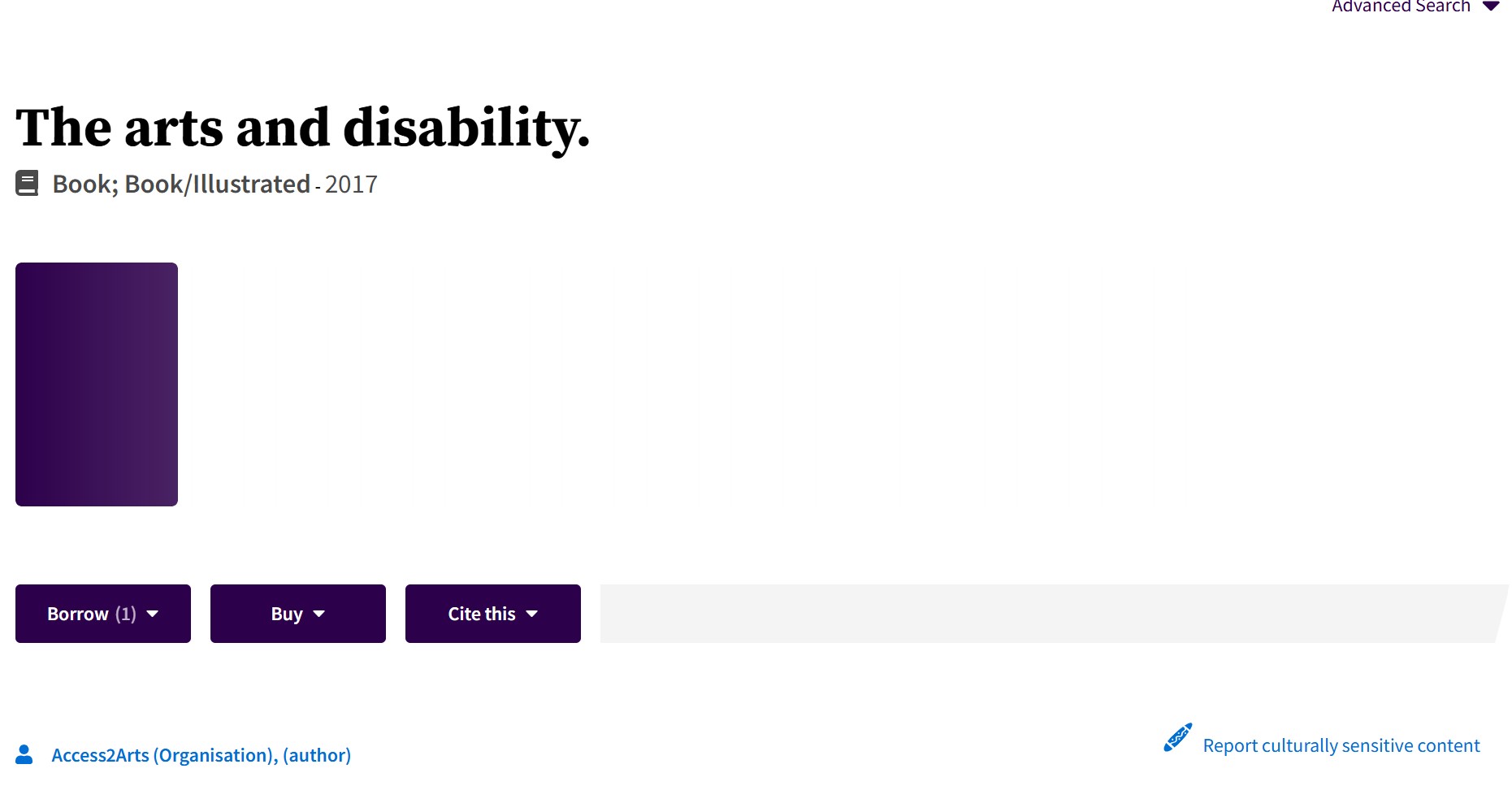 "The Arts and Disability"
"The Arts and Disability" - Company @
- Company AT
-
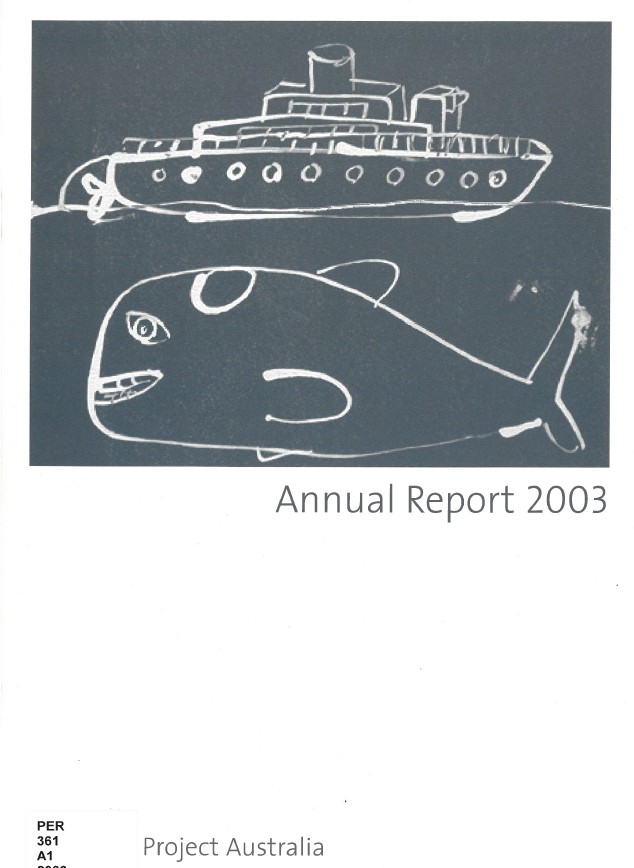 "Arts Project Australia - Annual Report 2003" Arts Project Australia - Annual Report 2003 - President’s Report, Director’s Report, Studio Manager’s Report, Exhibitions Report, Financials – reads, in part “Arts Project Australia was founded in 1974. It had the express purpose of exhibiting the art work of people with an intellectual disability in a manner that accords them the same dignity and respect as other artists.”
"Arts Project Australia - Annual Report 2003" Arts Project Australia - Annual Report 2003 - President’s Report, Director’s Report, Studio Manager’s Report, Exhibitions Report, Financials – reads, in part “Arts Project Australia was founded in 1974. It had the express purpose of exhibiting the art work of people with an intellectual disability in a manner that accords them the same dignity and respect as other artists.” -
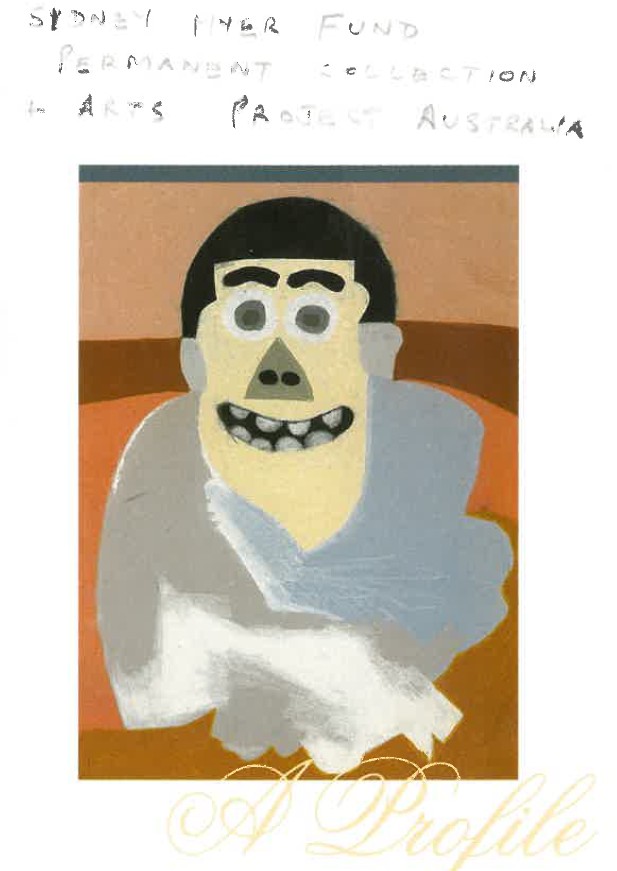 "Arts Project Australia - Sidney Myer Fund Permanent Collection Exhibition 1999 - Program" Arts Project Australia - Sidney Myer Fund Permanent Collection Exhibition 1999 - Program - reads, in part "The Sidney Myer Fund Permanent Collection is one of the only collections of artwork by people with intellectual disability in Australia."
"Arts Project Australia - Sidney Myer Fund Permanent Collection Exhibition 1999 - Program" Arts Project Australia - Sidney Myer Fund Permanent Collection Exhibition 1999 - Program - reads, in part "The Sidney Myer Fund Permanent Collection is one of the only collections of artwork by people with intellectual disability in Australia." -
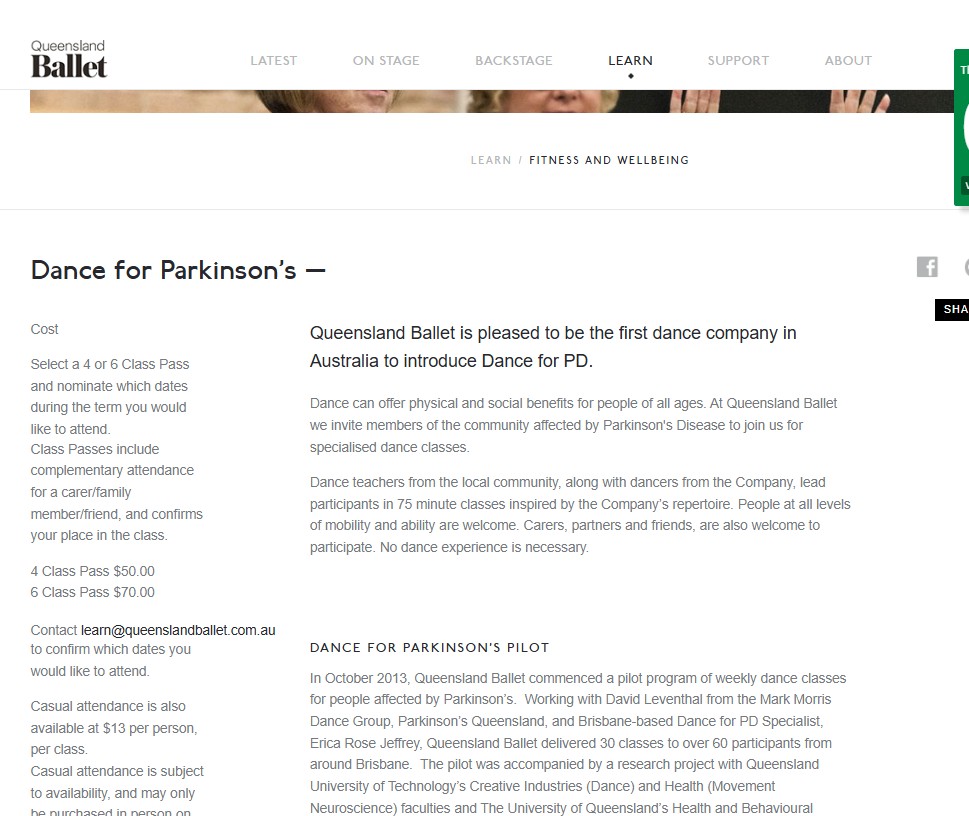 "Queensland Ballet - Dance for Parkinsons" Queensland Ballet 'Dance for Parkinsons' 2015 - reads, in part "Dance can offer physical and social benefits for people of all ages. At Queensland Ballet we invite members of the community affected by Parkinson's Disease to join us for specialised dance classes."
"Queensland Ballet - Dance for Parkinsons" Queensland Ballet 'Dance for Parkinsons' 2015 - reads, in part "Dance can offer physical and social benefits for people of all ages. At Queensland Ballet we invite members of the community affected by Parkinson's Disease to join us for specialised dance classes." -
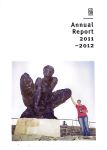 "DADAA Annual Report 2011-2012" DADAA Annual Report 2011-2012 - information about Vision, Mission and Goals, Chairperson and Executive Director’s Reports, Staff list, Participation, Programs including the Lost Generation Project, Sculptures by the Sea Tactile Tours, StARTSpeak, Art Link Children and Young People’s programs, Aging & Disability, Fourth International Arts And Health Conference, WA Disability Arts Grants Program, Regional Development and Consultancy, Partners, and Financials
"DADAA Annual Report 2011-2012" DADAA Annual Report 2011-2012 - information about Vision, Mission and Goals, Chairperson and Executive Director’s Reports, Staff list, Participation, Programs including the Lost Generation Project, Sculptures by the Sea Tactile Tours, StARTSpeak, Art Link Children and Young People’s programs, Aging & Disability, Fourth International Arts And Health Conference, WA Disability Arts Grants Program, Regional Development and Consultancy, Partners, and Financials -
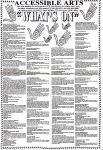 "Accessible Arts - What's On - Program" Accessible Arts - What's On 1992 - Program
"Accessible Arts - What's On - Program" Accessible Arts - What's On 1992 - Program - Robert Plant
-
"Kath Duncan, Gerard Goggin, Christopher Newell (2005) ‘Don’t Talk about Me... Like I’m Not Here': Disability in Australian National Cinema. Metro Magazine: Media & Education Magazine.146/147, pp. 152-159. https://search.informit.org/doi/10.3316/informit.043842788583710" Reads, in part "Disability is a central cultural identity and category in Australia, but this is not often realized. We seek to make a contribution to conversations and critical analyses of disability in Australian culture through an exploration of a privileged national cultural form, namely film. The trope of disability looms large in late twentieth century Australian cinema, and yet cultural comment on these ‘disabled’ scripts and performances has not yet considered a disabilities studies perspective. Accordingly, in this article we combine our different perspectives on disability and film into an account of how specific films use disability. In particular, we analyse key films from the 1990s as examples of powerful displays of bodies and personhood." References a range of films, including Proof (Jocelyn Moorhouse, 1991), Romper Stomper (Geoffrey Wright, 1992), Bad Boy Bubby (Rolf de Heer, 1993), Muriel's Wedding (PJ Hogan, 1994), Shine (Scott Hicks, 1996), Moulin Rouge! (Baz Luhrmann, 2001), My One Legged Dream Lover (writer Kath Duncan with dir. Penny Fowler-Smith, Christine Oslen 1998), Pins and Needles (writer Genni Batterham with dir. Barbara Chobocky, 1979), Riding the Gale (Genni Batterham with dir, Hugh Piper, 1987), Dance Me to My Song (writer Heather Rose with dir. Rolf De Heer, 1998), Heather Rose Goes to Cannes (Chris Corin, 1999), Myself When Fourteen, (Ivor, Arthur and Corinne Cantrill 1989),Film of Circles, Squares, Triangles, Lines and Dots (Arthur and Corinne Cantrill 1981), Rainbow Diary (Arthur and Corinne Cantrill 1984), House Gang (Mandy smith, 1997), Quentin Crashes Big Brother (Quentin Kenihan, 2002), Quentin, World at My Wheels (Quentin Kenihan, 2000), Ability Trek (Jacob Baldwin 1998)
- Petra Kuppers
-
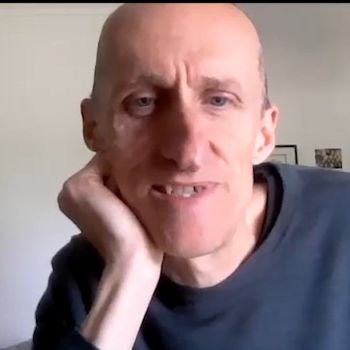 "Interview with Andy Jackson" Andy Jackson is a published poet focusing on disability and difference, has completed a PhD and is a lecturer of poetry and creative writing. INTERVIEW SUMMARY This is an oral history interview with poet Andy Jackson. Andy, who has Marfan syndrome, discusses how disability and visible difference have shaped his writing and poetry, explaining that he often writes about the meaning of the body within society. He emphasizes the importance of Disability Arts, noting a growing community of disabled writers and expressing the need for both disability-specific literary spaces and mainstream recognition. Andy also highlights the transformative role of online communities in creating networks for disabled individuals and the emergence of disability-focused literary journals, anticipating an anthology from a collaborative writing project he is involved with.
"Interview with Andy Jackson" Andy Jackson is a published poet focusing on disability and difference, has completed a PhD and is a lecturer of poetry and creative writing. INTERVIEW SUMMARY This is an oral history interview with poet Andy Jackson. Andy, who has Marfan syndrome, discusses how disability and visible difference have shaped his writing and poetry, explaining that he often writes about the meaning of the body within society. He emphasizes the importance of Disability Arts, noting a growing community of disabled writers and expressing the need for both disability-specific literary spaces and mainstream recognition. Andy also highlights the transformative role of online communities in creating networks for disabled individuals and the emergence of disability-focused literary journals, anticipating an anthology from a collaborative writing project he is involved with. - Janice Rieger
- Donna McDonald
-
"ArtsHub (2013) Cultural Policy fails people with disabilities-Arts Access Australia is running a campaign to get a better deal for people with disabilities from the National Cultural Policy. 20 Mar 2013, ArtsHub" Reads, in part "By now you will have heard that the National Cultural Policy offers little for Australians with a disability. Not only is there no funding for the National Arts and Disability Strategy, but instead, the policy calls for a culture of tolerance towards people with a disability."
- Undercover Artist Festival
-
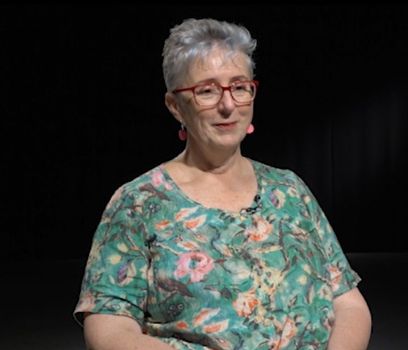 "Interview with Jenny Simpson" Jenny is CEO and Artistic Director of AWESOME Arts Australia while also a Musical Director of the Mighty Camelot Community Choir and a Sessional Academic at the Western Australian Academy of Performing Arts at Edith Cowan University. Interview Summary Jenny Simpson is the CEO and Artistic Director of AWESOME Arts Australia. She grew up in a musical family and always had an interest in the arts. After working in the corporate world, she decided to pursue a role in the arts to make a difference in the community. She has since focused on engaging young people with disabilities in the arts, and has worked on projects and festivals that promote inclusivity and accessibility. She believes that the perception of disability arts is changing and hopes to see more individuals with disabilities involved in arts management.
"Interview with Jenny Simpson" Jenny is CEO and Artistic Director of AWESOME Arts Australia while also a Musical Director of the Mighty Camelot Community Choir and a Sessional Academic at the Western Australian Academy of Performing Arts at Edith Cowan University. Interview Summary Jenny Simpson is the CEO and Artistic Director of AWESOME Arts Australia. She grew up in a musical family and always had an interest in the arts. After working in the corporate world, she decided to pursue a role in the arts to make a difference in the community. She has since focused on engaging young people with disabilities in the arts, and has worked on projects and festivals that promote inclusivity and accessibility. She believes that the perception of disability arts is changing and hopes to see more individuals with disabilities involved in arts management. -
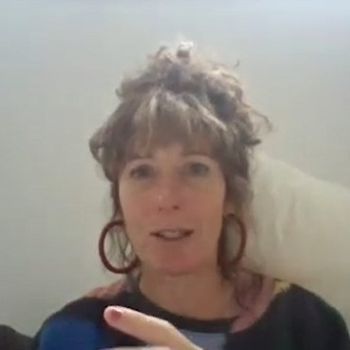 "Interview with Jodee Mundy OAM" Jodee Mundy OAM is a Disabled creative director, performer, writer, activist, creative producer, executive producer, commissioner, interpreter, film, festival maker and cultural leader. Interview Summary Jodee Mundy OAM, is an artist and festival director who identifies as Coda (child of Deaf adults) and lives with chronic illness reflects on the historical and ongoing challenges faced by Deaf and Disabled artists in Australia. Her work is deeply political, aiming to tell untold stories and bring visibility to marginalized communities. Despite significant achievements, Jodee stresses the need for structural support and inclusivity within the industry, especially given the limitations of hybrid access models post-pandemic. Jodee's personal journey, including her recent incurable cancer diagnosis, shapes her advocacy for a culture of care and well-being in the arts. Jodee leads Alter State, Australia’s Disability- led arts festival presented by Arts Centre Melbourne and Arts Access Victoria.
"Interview with Jodee Mundy OAM" Jodee Mundy OAM is a Disabled creative director, performer, writer, activist, creative producer, executive producer, commissioner, interpreter, film, festival maker and cultural leader. Interview Summary Jodee Mundy OAM, is an artist and festival director who identifies as Coda (child of Deaf adults) and lives with chronic illness reflects on the historical and ongoing challenges faced by Deaf and Disabled artists in Australia. Her work is deeply political, aiming to tell untold stories and bring visibility to marginalized communities. Despite significant achievements, Jodee stresses the need for structural support and inclusivity within the industry, especially given the limitations of hybrid access models post-pandemic. Jodee's personal journey, including her recent incurable cancer diagnosis, shapes her advocacy for a culture of care and well-being in the arts. Jodee leads Alter State, Australia’s Disability- led arts festival presented by Arts Centre Melbourne and Arts Access Victoria. -
"Australia Government (2019) My Art Goals: NDIS and the Arts. Canberra: Department of Communication and Arts." Reads, in part "My art goals shows some of the ways National Disability Insurance Scheme (NDIS) participants who have creative or cultural jobs, or who want to participate recreationally in the arts, can reach their goals. My art goals provides information about how the NDIS might support participants with arts goals, or about what supports or services might be available outside the NDIS."
- Meeting Place Arts and Disability Forum
- A2K Media
-
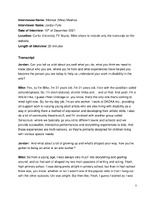 "Interview with Mike Moshos" Mike Moshos is a creative director, writer, actor and disability advocate. Interview Summary Mike Moshos is an arts worker and creator living with achondroplasia who provides support to young adult artists with disabilities and engages in community theatre and interactive performances for children with special needs. His personal experiences and growing political awareness have led him to advocate for the rights of disabled individuals and strive for equity in the arts. Mike has a deep passion for storytelling and is currently writing a science fiction novel while enjoying his role as Bing in an interactive children's show. He believes that all art is inherently political and that every piece of work, whether overtly or subtly, expresses a stance on societal issues.
"Interview with Mike Moshos" Mike Moshos is a creative director, writer, actor and disability advocate. Interview Summary Mike Moshos is an arts worker and creator living with achondroplasia who provides support to young adult artists with disabilities and engages in community theatre and interactive performances for children with special needs. His personal experiences and growing political awareness have led him to advocate for the rights of disabled individuals and strive for equity in the arts. Mike has a deep passion for storytelling and is currently writing a science fiction novel while enjoying his role as Bing in an interactive children's show. He believes that all art is inherently political and that every piece of work, whether overtly or subtly, expresses a stance on societal issues.
